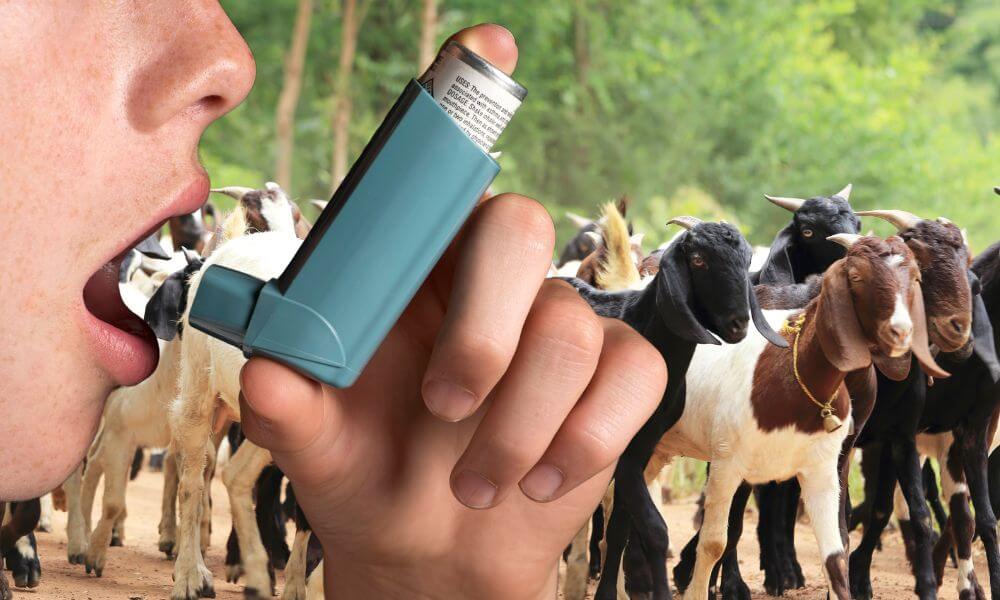But it’s probably safe to assume that a semantic argument is not what you came here for.
While goats cannot really have asthma in that sense, there’s still a lot of important information for you to know about goats and potential lung and respiratory issues, so let’s find out more.

What can cause a goat to cough?
Firstly, there are a lot of potentially simple explanations you should first consider.
It could be something as simple as dust from hay, or gravel.
Dust thrown up from the environment can cause coughing and heavy breathing in goats just like it can with us.
Be sure to clean up their living space regularly to combat the build-up of dust.
But there are more dangerous reasons if that doesn’t seem to be the cause.
Respiratory infections are common and take myriad forms, often coming from bacteria in their food or the environment.
These can often be treated with a course of antibiotics, but you should consult with a vet on this to ensure the diagnosis is correct.
Lungworm is another potential cause, and I’ll get into that later.
If you’ve eliminated the possibility of dust or bacterial infection, then it may well be a parasite like lungworm.
Again, you should ideally speak to a vet if you suspect lungworm.
Ultimately, though, asthma is not something that is recognized in goats.
Asthma is defined as a lung condition which persists, and can be developed at any age, though commonly in childhood.
Goats do not suffer from asthma in the same way that we do.
So, how do you treat these respiratory illnesses in goats?
How do you treat respiratory disease in goats?
As I’ve tried to stress, the most important thing you can do is speak to a vet.
They will be able to give you an accurate diagnosis and tell you what the exact nature of the problem is.
This is vital information in your first steps. It ensures you are giving the correct treatment.
Once your vet has diagnosed the issue, they should, then, be able to prescribe the proper treatment.
For bacterial infections, a course of antibiotics is the most common solution.
Make sure to get your goat through the entire course and not to stop administering the antibiotics, even if the goat appears well again.
For lungworm, the treatments are a bit more varied, depending on the severity.
An anti-parasitic like Ivermectin is one of the most common treatments, along with something like Fenbendazole.
Again, be sure to only ever use these medications in consultation with a vet.
You also need to be aware that goats on these medications should not be milked or used for meat until a certain time has passed.
So, the good news is that most common respiratory issues affecting goats are relatively easy to treat, assuming you have had the proper diagnosis.
Can goats get upper respiratory infection?
Yes, goats can get a variety of upper respiratory infections, too.
These, for the most part, are also caused by parasites, such as the larvae of Oestrus ovis, foreign bodies in the nasal passage, and even nasal tumors.
The problem is that there is really nothing you can do about the potential of parasites on their pasture.
There is always the potential for them to be there, and to find their way into your goats’ respiratory systems.
The important thing is being able to spot the signs.
What are the symptoms of lungworm in goats?
Lungworm is one of the most common issues affecting goats, so let’s look at how to spot it.
Firstly, you’ll notice the coughing.
This could be what leads you to worry that they have asthma.
The goat will cough and have an increased respiratory rate, respiratory distress and, eventually, complete failure.
They will show reduced weight gains, reduced milk production, and outright weight loss, too.
If you notice any of these symptoms, you should consult with a vet immediately.
Many problems can lead to these symptoms, so without expertise and apparatus, you’ll have a hard time properly diagnosing the lungworm.
Lungworm can also spread to the rest of the herd, and the larvae can survive an entire year in the soil.
Treatments are swift and effective, but you need to catch it as early as you can.
The best advice in virtually any medical emergency or moment of concern for your goat is to get a vet out to give the best chance of properly identifying the problem.
Goats, then, are not short on a wide variety of respiratory issues.
Any one of these problems can eventually be fatal if left untreated, but at best it will massively reduce their quality of life.
So, while we don’t use the term asthma for anything goats really suffer from, they do suffer from many issues like asthma—though just usually not chronically.
